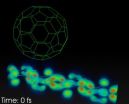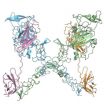(Press-News.org) LOS ANGELES – (May 30, 2014) – Green tea and its extracts have been widely touted as potential treatments for cancer, as well as several other diseases. But scientists have struggled to explain how the green tea and its extracts may work to reduce the risk of cancer or to slow the growth of cancer cells.
A study recently published online by the journal, Metabolomics, offers an explanation that researchers say could open a new area of cancer-fighting research. The study reports that EGCG, the active biologic constituent in green tea, changed the metabolism of pancreatic cancer cells by suppressing the expression of an enzyme associated with cancer, LDHA.
The researchers also found an enzyme inhibitor, oxamate, which is known to reduce LDHA activity, operated in the same manner: It also disrupted the pancreatic cancer cells metabolic system.
"Scientists had believed they needed a molecular mechanism to treat cancer, but this study shows that they can change the metabolic system and have an impact on cancer," said Wai-Nang Lee, MD, corresponding author of the study and a Los Angeles Biomedical Research Institute (LA BioMed) lead researcher. "By explaining how green tea's active component could prevent cancer, this study will open the door to a whole new area of cancer research and help us understand how other foods can prevent cancer or slow the growth of cancerous cells."
Using sophisticated metabolic profiling methods, the researchers found EGCG disrupted the balance of "flux" throughout the cellular metabolic network. Flux is the rate of turnover of molecules through a metabolic pathway. The researchers found the EGCG disrupted this balance in the same manner that oxamate, a known LDHA inhibitor, did.
Based on this finding, they concluded that both EGCG and oxamate reduced the risk of cancer by suppressing the activity of LDHA, a critical enzyme in cancer metabolism, thereby disrupting the balance in the cancer cells metabolic functions.
"This is an entirely new way of looking at metabolism," said Dr. Lee. "It is no longer a case of glucose goes in and energy comes out. Now we understand how cancer cell metabolism can be disrupted, and we can examine how we can use this knowledge to try to alter the course of cancer or prevent cancer."
INFORMATION:
About LA BioMed
Founded in 1952, LA BioMed is one of the country's leading nonprofit independent biomedical research institutes. It has approximately 100 principal researchers conducting studies into inherited diseases, infectious diseases, illnesses caused by environmental factors and more. It also educates young scientists and provides community services, including prenatal counseling and childhood nutrition programs. LA BioMed is academically affiliated with the David Geffen School of Medicine at UCLA and located on the campus of Harbor-UCLA Medical Center. For more information, please visit http://www.LABioMed.org
Study explains how green tea could reduce pancreatic cancer risk
Findings open a new area for research into cancer prevention
2014-05-30
ELSE PRESS RELEASES FROM THIS DATE:
Research shows overall survival benefit for patients with Stage III soft tissue sarcomas
2014-05-30
CHICAGO, IL (May 30, 2014)—Fox Chase Cancer Center researchers have carried out the first retrospective analysis of adjuvant chemotherapy's impact on overall survival in patients with stage III soft tissue sarcomas (STS), adjusted for socioeconomic status and other variables. The findings show that regardless of socioeconomic status and comorbidities, adjuvant chemotherapy improved survival by approximately 23 percent in stage III STS. Study leader Sujana Movva, MD, Medical Oncologist at Fox Chase, will present the findings the 50th Annual Meeting of the American Society ...
More patients with ovarian cancer are receiving chemotherapy before surgery
2014-05-30
CHICAGO, IL (May 30, 2014)—The use of chemotherapy before surgery to remove ovarian cancer has increased dramatically in recent decades, particularly among certain patients, according to a new analysis from Fox Chase Cancer Center that will be presented at the 50th Annual Meeting of the American Society of Clinical Oncology.
Looking back at medical records from more than 58,000 women, Fox Chase's Angela Jain, MD, Medical Oncologist and co-investigator Elizabeth Handorf, PhD, member of the Biostatistics and Bioinformatics Facility, found that only 8.94% received chemotherapy ...
Compounds in saliva and common body proteins may fend off DNA-damaging chemicals
2014-05-30
A compound in saliva, along with common proteins in blood and muscle, may protect human cells from powerful toxins in tea, coffee and liquid smoke flavoring, according to results of a new study led by investigators at the Johns Hopkins Kimmel Cancer Center.
The findings, reported online May 19 in Food and Chemical Toxicology, suggest that people naturally launch multiple defenses against plant chemicals called pyrogallol-like polyphenols or PLPs found in teas, coffees and liquid smoke flavoring. The presence of these defenses could help explain why PLPs are not crippling ...
New satellite animation shows the end of Hurricane Amanda
2014-05-30
VIDEO:
This animation of visible and infrared imagery from NOAA's GOES-West satellite shows the weakening of Hurricane Amanda from May 28 to its dissipation on May 30.
Click here for more information.
A new animation of visible and infrared imagery from NOAA's GOES-West satellite shows the weakening and dissipation of the Eastern Pacific Ocean's Hurricane Amanda. The animation that runs from from May 28 to May 30 was created at NASA/NOAA's GOES Project at NASA's Goddard Space ...
Hepatitis C reactivation doesn't worsen survival for HIV+ patients diagnosed with lymphoma
2014-05-30
CHICAGO, IL (May 30, 2014)—More than a quarter of HIV+ patients are also infected with the Hepatitis C virus (HCV), which may complicate treatment and care decisions after a cancer diagnosis. The specifics of those complications haven't been well-researched in the past. Results from a new Fox Chase Cancer Center study on this patient population may start filling in that gap.
Fox Chase Hematologist and Medical Oncologist Stefan K. Barta, MD, MS, MRCP – who led the study – analyzed data from HIV+ patients diagnosed with lymphoma, collected over 17 years, to better understand ...
Identification of central nervous system involvement for patients with AIDS-related lymphomas
2014-05-30
CHICAGO, IL (May 30, 2014)—Patients with AIDS-related lymphomas (ARL) may face an increased risk of central nervous system involvement (CNSi) compared to other lymphomas. The effect of CNSi on survival outcomes, however, hasn't been thoroughly examined until now.
In a new study led by Fox Chase Cancer Center Hematologist and Oncologist Stefan K. Barta, MD, MS, MRCP, researchers report that CNSi – identified at the time of an ARL diagnosis – does not appear to have an impact on overall survival. Dr. Barta's collaborators will present the findings at the 50th Annual Meeting ...
Moffitt Cancer Center instrumental in new clinical guidelines for cancer-related fatigue
2014-05-30
TAMPA, Fla. (May 30, 2014) – Fatigue is a debilitating problem for cancer patients undergoing treatment; however, it also poses a huge detriment after treatment and can significantly affect quality of life. Approximately 30 percent of cancer patients endure persistent fatigue for several years after treatment, according to an American Society of Clinical Oncology Expert Panel co-chaired by Paul Jacobsen, Ph.D., associate center director of Population Sciences at Moffitt Cancer Center.
ASCO created the panel to develop assessment, screening, and treatment guidelines for ...
First real time movies of the light-to-current conversion in an organic solar cell
2014-05-30
VIDEO:
Real time quantum simulation of the conversion of light into current in an organic solar cell composed of a polymer chain, and a Fullerene buckyball. The movie lasts for about...
Click here for more information.
Photovoltaic cells directly convert sun light into electricity and hence are key technological devices to meet one of the challenges that mankind has to face in this century: a sustainable and clean production of renewable energy. Organic solar cells, using polymeric ...
Research details how developing neurons sense a chemical cue
2014-05-30
Symmetry is an inherent part of development. As an embryo, an organism's brain and spinal cord, like the rest of its body, organize themselves into left and right halves as they grow. But a certain set of nerve cells do something unusual: they cross from one side to the other. New research in mice delves into the details of the molecular interactions that help guide these neurons toward this anatomical boundary.
In an embryo, a neuron's branches, or axons, have special structures on their tips that sense chemical cues telling them where to grow. The new findings, by ...
Study highlights side effects felt by BRCA mutation carriers after cancer risk-reducing procedure
2014-05-30
PHILADELPHIA — The majority of women with cancer causing BRCA1 and BRCA2 mutations experience sexual dysfunction, menopausal symptoms, cognitive and stress issues, and poor sleep following prophylactic removal of their Fallopian tubes and ovaries - a procedure known as risk-reducing salpingo-oophorectomy (RRSO) - according to results of a new study from the Abramson Cancer Center and the Perelman School of Medicine at the University of Pennsylvania. The team's findings, which reaffirm the need for a better understanding of how to manage long-term effects of the risk-reducing ...
LAST 30 PRESS RELEASES:
Scientists discover why we know when to stop scratching an itch
A hidden reason inner ear cells die – and what it means for preventing hearing loss
Researchers discover how tuberculosis bacteria use a “stealth” mechanism to evade the immune system
New microscopy technique lets scientists see cells in unprecedented detail and color
Sometimes less is more: Scientists rethink how to pack medicine into tiny delivery capsules
Scientists build low-cost microscope to study living cells in zero gravity
The Biophysical Journal names Denis V. Titov the 2025 Paper of the Year-Early Career Investigator awardee
Scientists show how your body senses cold—and why menthol feels cool
Scientists deliver new molecule for getting DNA into cells
Study reveals insights about brain regions linked to OCD, informing potential treatments
Does ocean saltiness influence El Niño?
2026 Young Investigators: ONR celebrates new talent tackling warfighter challenges
Genetics help explain who gets the ‘telltale tingle’ from music, art and literature
Many Americans misunderstand medical aid in dying laws
Researchers publish landmark infectious disease study in ‘Science’
New NSF award supports innovative role-playing game approach to strengthening research security in academia
Kumar named to ACMA Emerging Leaders Program for 2026
AI language models could transform aquatic environmental risk assessment
New isotope tools reveal hidden pathways reshaping the global nitrogen cycle
Study reveals how antibiotic structure controls removal from water using biochar
Why chronic pain lasts longer in women: Immune cells offer clues
Toxic exposure creates epigenetic disease risk over 20 generations
More time spent on social media linked to steroid use intentions among boys and men
New study suggests a “kick it while it’s down” approach to cancer treatment could improve cure rates
Milken Institute, Ann Theodore Foundation launch new grant to support clinical trial for potential sarcoidosis treatment
New strategies boost effectiveness of CAR-NK therapy against cancer
Study: Adolescent cannabis use linked to doubling risk of psychotic and bipolar disorders
Invisible harms: drug-related deaths spike after hurricanes and tropical storms
Adolescent cannabis use and risk of psychotic, bipolar, depressive, and anxiety disorders
Anxiety, depression, and care barriers in adults with intellectual and developmental disabilities
[Press-News.org] Study explains how green tea could reduce pancreatic cancer riskFindings open a new area for research into cancer prevention



